Series 11 goes back to the past one last time as the Doctor and friends find themselves in early 17th century Lancashire. The village of Bilehurst Cragg is in the middle of their witch trials and the team soon finds themselves interfering history to save innocent souls. Spoiler alert: “The Witchfinders” find aliens instead of witches.
The Morax and why we leave trees alone
I’ve been making it clear with my reviews of “Rosa” and “Demons of the Punjab” that in general, I prefer historical episodes of Doctor Who. “The Witchfinders” is no different, though this latest episode has a different feel to it. In many ways, I feel it’s more “Doctor Who-like” than other episodes this season. Not that it’s a problem that series 11 has been a breath of fresh air, not at all. “The Witchfinders” is more standard in its treatment of its villain and structure but still has a unique Thirteenth Doctor and series 11 vibe to it.
So, what about the monster of the week? Well, for starters, we’re back to being able to call it that. Series 11′s villains have mostly been humans themselves, with aliens being either a red herring or just going about their life. Tim Shaw from the season premiere has been the only exception until now. Meet the Morax, mud-like creatures imprisoned on Earth for war crimes. It would probably be fair to say that they won’t go down as one of the iconic monsters in Doctor Who history, but they work well within “The Witchfinders”. They pose a real threat and their true nature is a mystery to be uncovered. Most importantly, they work well within the historical framework that the episode presents.
Take the human element out of “The Witchfinders” and the Morax become a bunch of bland monsters. On their own, they are just yet another race full of bloodlust that the Doctor has to stop from conquering Earth. In the context of the 17th century witch trials, the Morax become the magic that people fear, the “satanic” force driving people to hurt each other. Ultimately, this is what “The Witchfinders” and arguably the whole of series 11 is about. It’s about what humans do in certain situations, how they react and let themselves be corrupted. The Morax merely heighten and enable this and in that, they do a good job. Plus the make-up department must have had fun with their design, so there’s that.
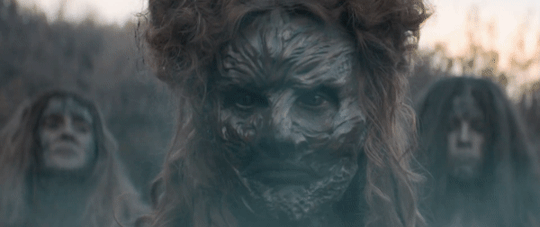
Evil be to him that evil thinks
In the Morax we got our traditional alien villains but “The Witchfinders” was more complex than that. Before the Morax were revealed, we had Becka Savage and King James I (VI of Scotland) leading the witch-hunt. Becka (Siobhan Finneran) starts the whole conflict by chopping up the Pendle Hill tree and setting the Morax free. And isn’t that so fitting? Her pure pettiness causes the whole mess and then her denial escalates it. She’s compared to Yaz’s childhood bully but what makes Becka an interesting character is that she’s not pure evil. She’s certainly a deeply flawed person but her self-preservation comes from a genuine place. Still, not many tears were shed as the Morax finally took over her. Becka joins the line of series 11 humans who were corrupted for some reason or another.
Then there’s King James. Doctor Who is known for a great many things but nuanced portrayal of historical figures is hardly one of them. And yet, James I and VI becomes this layered figure who’s never quite good or bad. A huge part of it is Alan Cumming, who plays the character with such flair that it’s hard not to like him. His queerness is also made all but explicit in his interactions with Ryan, so kudos for historical accuracy there. He is also blatantly sexist towards the Doctor, takes a disturbing pleasure in talking about torture and hunting down “witches”, and has a general disregard for human life. This is also probably historically accurate. So what can we make of Cumming’s King James?
The best scene of the episode sums it up well. The discussion the Doctor has with James before her ducking is such a powerful scene between two great actors. James’s family history and morals are questioned but so is the Doctor’s own sense of self and the titles they both hide behind. One is an ancient alien being who’s had a dozen lives before. The other is the King of England (and Wales), Scotland, and Ireland, going down for many things in history, including the Gunpowder Plot and the English Bible. And yet, talking there in Bilehurst Cragg they are equals. James believes what he is doing is good and the Doctor reasons that there is no inherent good or evil.
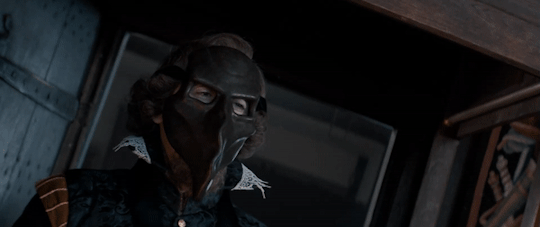
In this, King James embodies the philosophy that series 11 has on humanity. Just because someone believes that they’re right that doesn’t mean that they are immune to corruptness. It’s not so much moral ambiguity as the need for balance in all things. And okay, so James might be an overall jerk. He’s certainly deserved for the Doctor to be pissed off at him. His portrayal still ends being one of the most nuanced ones Doctor Who has ever done on a historical figure. There are characters like Rosa Parks who are universally seen as a good and represented as such. Not that there’s anything wrong with that, but James’s character offers something delightfully different.
Personally, I still don’t know where to stand with him. His introduction included insults towards the Doctor and he almost had her killed. Then again, he seemed sincere in his belief that he was doing God’s work. So overall, we have a King James who is more or less historically accurate and who is not clearly a villain of the story but not its hero, either. In that, he’s the embodiment of humanity in series 11, though still falling on the deeply flawed side. I might not love the character but I certainly like the way he was written and how Cummings as an actor presented him.
Team! Gang! Fam?
“The Witchfinders” gave the Doctor more time away from her team than perhaps any episode so far. As much as I love Team TARDIS, this was a nice change and gave Thirteen plenty to do. King James patronising her was inevitable in that sooner or later the Doctor had to realize what being a woman in the past means. Her reactions were priceless and we finally got a frustrated acknowledgment of how this never would have happened before. Not that she’s any less capable but she’s no longer a white man running around and taking charge. It’s also interesting how this story never would have worked with any other Doctor. They’ve always been men so far so they hardly would have been accused of witchcraft, at least not int eh way Thirteen was.
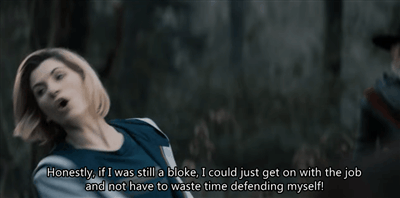
Whittaker also gets to show a wider range of the Doctor than before. The fury and darkness that’s deep inside are more tangible without her friends around. As mentioned, her conversation with King James is an episode highlight and she gets plenty of light-hearted moments as well. It’s also great how careless Thirteen really is and how it has actual consequences this time around. A minute after she tells her friends not to interfere she jumps into the river to try to save someone. To be fair to her, she was supposed to interfere in this case and she hasn’t been causing paradoxes left and right. When she knows she can’t save someone, like Prem, she doesn’t. But since this is the Doctor after all, sooner or later she’ll find herself in a catastrophic situation and I can’t wait to see how she handles that.
The rest of Team TARDIS gets a bit of a breather. Yaz is becoming more and more adept at getting to the bottom of the mysteries which is good to see. Her compassion is a major driving force as well and it’s through her that Willa has a larger role to play. Ryan gets his own moments with King James and can now say that a Stuart king blatantly flirted with him. Their conversation about loss is undermined by the fact that Ryan’s reactions and the way Tosin Cole delivers them are quite cringy at times, but hey, he’s only recently left his teenage years behind. Graham gets mistaken to be the man in charge, an inevitable consequence of being white and male and back in time. He handles it well and silently apologizes to the Doctor, even restoring her authority.
There is a certain worry that a team of four means not enough screentime for each individual. But so far every episode has given them plenty to work with. They are still important to the story and have their individual tasks even though the focus is more clearly on the Doctor. More companion focused episodes like “Demons of the Punjab” are appreciated but the same is true for the Doctor. The dynamic is working even when it’s more in the background. I wouldn’t complain if next week we were back to some more quality companion scenes, though.
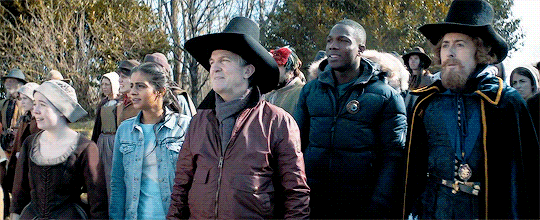
Closing thoughts
“The Witchfinders” yet again proves why we need historical episodes in Doctor Who. It’s not just because of some unspoken quota that has to be met so we see the past as well as the future. They take an event, in this case the Pendle Hill witch trials of 1612, and not only teach the audience about them but draw relevant comparisons. Learning about a part of British history that’s not too well-known is fun; learning about human nature through these situations is even more fun. That’s what both episode 8 and series 11 boil down to so far: an exploration of humanity itself. Whether that’s in Sheffield or another galaxy or somewhere in Earth’s past, we get to see what would make humans be the monsters the Doctor has to fight.
This episode had a better balance of aliens but also human adversaries than the season so far. The approach of “Rosa”, for example, was much appreciated, but sometimes we just need species like the Morax. Not because it’s not DW without a good monster but because they highlight what’s really important. “The Witchfinders” did an excellent job of portraying Becka as both an antagonist and a victim and offering a complex character in King James. I kept expecting him to be irredeemably awful but he’s just not.
The episode wasn’t perfect, of course, but all its flaws are irrelevant as it works as a whole. Okay, so the companions maybe could have had more to do, Willa didn’t end up being too interesting and the convenience of the Morax merely knocking Team TARDIS out even though they’d want to kill them anyway is a bit too much. The revelation comes late and so the conclusion is rushed but nowhere near as much as with Chibnall’s episodes. Visually, the series is still gorgeous, though the editing has a noticeable problem. Mainly the Doctor’s two river scenes and the burning of the Morax, but nothing awful. Just… off. The first half of the season I thought it might the directing I had a problem with but no, it’s mostly just the editing.
All in all, though, yet another very strong episode. Not as deeply emotional as the other two historicals but poignant nonetheless. “The Witchfinders” also manages to be more subtle about its message than the rest of the season while not being afraid to call things like sexism out. What a way to explore the ridiculousness of the witch trials.
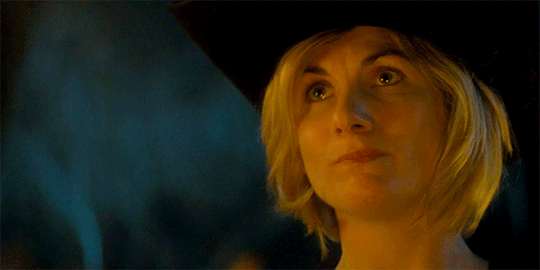
Next week it’s the penultimate episode of 2018 as the Doctor and fam find themselves in modern-day Norway in “It Takes You Away”.
Images courtesy of the BBC

